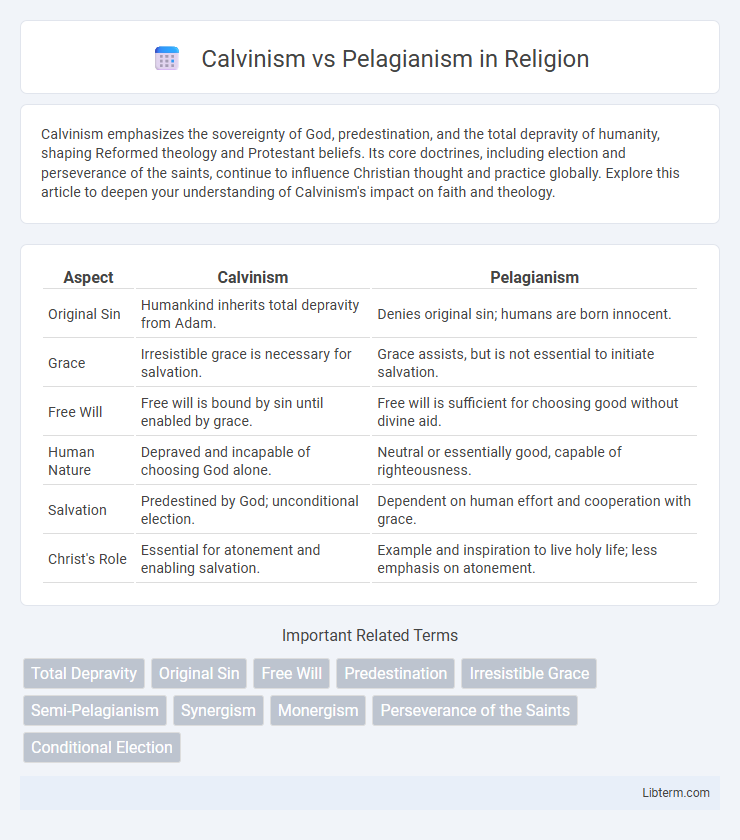Calvinism emphasizes the sovereignty of God, predestination, and the total depravity of humanity, shaping Reformed theology and Protestant beliefs. Its core doctrines, including election and perseverance of the saints, continue to influence Christian thought and practice globally. Explore this article to deepen your understanding of Calvinism's impact on faith and theology.
Table of Comparison
| Aspect | Calvinism | Pelagianism |
|---|---|---|
| Original Sin | Humankind inherits total depravity from Adam. | Denies original sin; humans are born innocent. |
| Grace | Irresistible grace is necessary for salvation. | Grace assists, but is not essential to initiate salvation. |
| Free Will | Free will is bound by sin until enabled by grace. | Free will is sufficient for choosing good without divine aid. |
| Human Nature | Depraved and incapable of choosing God alone. | Neutral or essentially good, capable of righteousness. |
| Salvation | Predestined by God; unconditional election. | Dependent on human effort and cooperation with grace. |
| Christ's Role | Essential for atonement and enabling salvation. | Example and inspiration to live holy life; less emphasis on atonement. |
Introduction to Calvinism and Pelagianism
Calvinism, rooted in the teachings of John Calvin, emphasizes predestination and total depravity, asserting that salvation is solely the result of God's sovereign grace rather than human effort. Pelagianism, originating with the British monk Pelagius, denies original sin and insists that humans have the innate capacity to choose good without divine aid. The theological conflict between Calvinism and Pelagianism centers on the nature of human free will, grace, and salvation.
Historical Origins and Development
Calvinism, rooted in 16th-century Reformation theology, emphasizes predestination and the total depravity of humanity, fundamentally shaped by John Calvin's writings and teachings. Pelagianism, originating in the early 5th century through Pelagius, asserts the innate human ability to choose good without divine grace, sparking significant controversy and condemnation by early Church Fathers like Augustine. The historical development of Calvinism solidified within Protestantism, while Pelagianism was declared heretical, influencing ongoing theological debates on free will and grace.
Key Doctrinal Differences
Calvinism emphasizes total depravity, unconditional election, and irresistible grace, teaching that salvation is solely the work of God's sovereign will, independent of human effort. Pelagianism asserts the innate ability of humans to choose good without divine intervention, rejecting original sin and emphasizing free will in the process of salvation. The core doctrinal divergence lies in Calvinism's belief in predestination and divine grace versus Pelagianism's focus on human autonomy and moral capability.
Views on Human Nature and Sin
Calvinism asserts total depravity, meaning humans are inherently sinful and incapable of choosing God without divine grace, rooted in the doctrine of original sin. Pelagianism rejects original sin, claiming humans are born morally neutral and possess the natural capacity to choose good without the necessity of God's grace. These contrasting views frame Calvinism's emphasis on divine predestination versus Pelagianism's focus on human free will and moral responsibility.
Salvation: Grace versus Free Will
Calvinism emphasizes salvation as a result of God's sovereign grace, asserting that humans are inherently sinful and incapable of choosing faith without divine intervention. Pelagianism argues that individuals possess the free will to accept or reject salvation independently, highlighting moral responsibility and human effort in attaining righteousness. The theological tension centers on whether salvation is predestined by grace or contingent upon human choice and merit.
The Role of Predestination
Calvinism centers on the doctrine of predestination, asserting that God has sovereignly chosen who will receive salvation, independent of human actions or merit. Pelagianism rejects predestination, emphasizing human free will and the inherent capacity to choose good without divine intervention. This fundamental difference shapes their contrasting views on grace, sin, and salvation within Christian theology.
Scriptural Interpretations
Calvinism interprets Scripture emphasizing total depravity, unconditional election, and irresistible grace as seen in passages like Romans 9 and Ephesians 2:8-9, highlighting God's sovereign choice in salvation. Pelagianism reads biblical texts such as Deuteronomy 30:19 and Genesis 2:16-17 to stress human free will and moral responsibility in achieving righteousness without inherent original sin. The contrasting exegesis of texts about grace, sin, and human nature underlines the fundamental theological divergence between divine sovereignty and human ability.
Influence on Christian Thought
Calvinism significantly shaped Reformed theology by emphasizing predestination, divine sovereignty, and total depravity, influencing Protestant doctrines on salvation and grace. Pelagianism, rejected as heretical by mainstream Christianity, underscored human free will and moral responsibility, provoking critical theological debates about original sin and divine grace. These contrasting views have profoundly impacted Christian understandings of salvation, human nature, and the interplay between divine grace and human effort.
Modern Perspectives and Relevance
Modern perspectives on Calvinism emphasize God's sovereignty and predestination, reinforcing doctrines of grace and election in contemporary theology. Pelagianism, largely rejected by mainstream Christianity, resurfaces in debates on human free will and moral responsibility, influencing discussions on ethical decision-making and personal accountability. The relevance of both lies in shaping current dialogues on divine justice, human nature, and salvation within diverse Christian communities.
Conclusion: Lasting Impact of the Debate
The enduring debate between Calvinism and Pelagianism has significantly shaped Christian theology, influencing doctrines on grace, predestination, and human free will. Calvinism's emphasis on divine sovereignty and predestination has deeply impacted Reformed theology and evangelical beliefs worldwide. Pelagianism's focus on human effort and moral responsibility continues to provoke discussions on sin and salvation within various Christian traditions.
Calvinism Infographic

 libterm.com
libterm.com